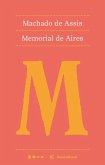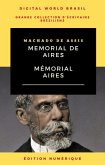Published in 1908, Memorial de Aires is Machado de Assis' last novel and, at the same time, his literary testament. In this work, the author reaches the height of stylistic and emotional maturity, offering the reader a narrative of rare sensitivity and introspection. Counselor Aires, a retired diplomat and keen observer of life, records in his diary the events and reflections that mark the last years of his existence. More than a simple memoir, the book is a dive into the soul of a man who observes the world with gentle irony, elegant melancholy, and a deeply human wisdom. In its pages, we follow the serene and restrained love between Fidélia, a young and mysterious widow, and Tristão, a man torn between duty and desire. The counselor, narrator, and confidant observes this relationship with the gaze of one who has already understood the fleeting nature of time and the delicacy of human passions. The story unfolds under the shadow of old age, but without the weight of decay; on the contrary, Machado makes maturity a space for contemplation and subtlety, where what is left unsaid is as powerful as what is said. The language of Memorial de Aires is more serene, almost meditative, but still marked by Machado's irony-now less cutting, more philosophical. The tone is that of someone who, after exploring the depths of the human soul in works such as Dom Casmurro and Quincas Borba, returns to the surface not to judge, but to understand. This is the Machado of final introspection, of awareness of the ephemeral and the art of observing life as a delicate mirror of human destiny. This revised and adapted digital edition preserves all the beauty and complexity of the original text, while making it more accessible to contemporary readers. It is a unique opportunity to rediscover an essential classic of Brazilian literature with clarity, fluidity, and stylistic fidelity, ready to be read on any device. More than a novel, Memorial de Aires is an elegant farewell, a lesson about time, memory, and silence. A book to be read slowly, savored as a dialogue between the past and the present-between Machado's tradition and the modern gaze of those who seek to understand what it means to live, love, and age with dignity. Get your digital edition of Memorial de Aires now and immerse yourself in Machado de Assis's last and most refined creation-an eternal classic in the form of a reflection on the human condition itself.
Dieser Download kann aus rechtlichen Gründen nur mit Rechnungsadresse in A, B, BG, CY, CZ, D, DK, EW, E, FIN, F, GR, H, IRL, I, LT, L, LR, M, NL, PL, P, R, S, SLO, SK ausgeliefert werden.









